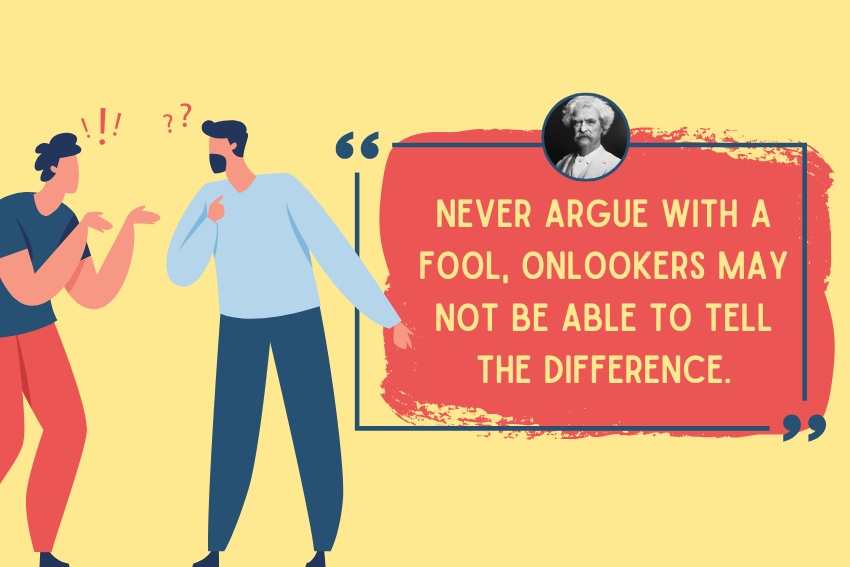Understanding the Quote “Never Argue with a Fool”
We live in a world where everyone shares their opinions everyday, so it’s hard not to get involved in every debate. But one timeless quote really matters to me: “Never argue with a fool; onlookers might not be able to tell the difference.” This proverb is simple and powerful, it encourages us to be careful where we invest our time and energy.

Basically, the quote warns us how futile and even dangerous it is to argue with someone who is stubbornly locked into their notions. In the context of this quote, a fool isn’t just someone lacking in knowledge; it’s someone not willing to consider another point of view. You waste your time when you debate a fool because you run the risk of watering down your credibility.
Imagine a heated debate taking place in a crowded room. Your reasoned arguments, no matter how sound they might be, may get drowned amidst the noise and chaos. People who cannot see the truth may think that you also are one of them participating in the foolishness. As a result, you are seen emerging not only exhausted but also misjudged.
Let’s learn what does meaning of fools, why we should think twice before engaging in such a debate and the reasons why you should never argue with a fool.
What Does Mean of Fools?
First of all, we have to understand what is meant by “fools.” Here fools are not just less knowledgeable or less intellectually endowed. Rather, they are representatives of those who are so attached to their beliefs that they rarely listen or try to understand other people’s ideas. Fools tend to cling to one’s opinion with great stubbornness and disregard for evidence, logic, or reason. They may resort to name-calling, becoming emotional, or manipulative ways in order to win an argument rather than engage in constructive dialogue.
The Nature of Foolishness
The nature of foolishness is multi-faceted. Some individuals may be uninformed perhaps because they have been sheltered from other ideas while others may be willfully ignorant, refusing to acknowledge facts that run contrary to their worldview. In either case, it is often pointless to engage in an argument. The mindset of the fool is characteristically closed to reason; thus, any persuasion is futile.
The other aspect is that the fool may seem full of confidence, and this can easily mislead. Perhaps bravado creates an aura of authority, which attracts those who are not in a position to know whether the arguments presented are correct or not. This in turn may bring out the point the quote is most concerned with – that observers cannot tell the difference between the wisdom of knowledgeable people and the foolishness of ignorant people.
The Dangers of Engaging with Fools
Wasting Time and Energy
Arguing with a foolish person can be a tiring experience. In most cases, it turns into a vicious circle where neither party is willing to give in or compromise. The time used in arguing with them could be better used in other constructive activities or reasoning with people who are willing to listen. Such arguments will continue to drain the person’s energy and keep the frustrated person upset, which could have been better used with other individuals.
Loss of Credibility
Engaging with a fool risks losing one’s credibility. As this quote suggests, a passerby will not be able to tell who is reasonable and who is unreasonable. In a heated debate, you may inadvertently stoop to the fool’s level, where the audience will consider you their equal in irrationality or emotionality. If the debate takes place in public or in front of another person, this can damage your reputation.
Escalation of Conflict
Fools love the heat of conflict. Arguing with them can build tensions to the point of creating a hostile atmosphere. Instead of understanding or equality, the conversation can devolve into personal attacks and inflammatory comments. This not only hurts the person, but also has an impact on onlookers, creating an unpleasant atmosphere in a social or professional setting.
Emotional Toll
Foolish arguing always has the potential to drain a person emotionally. Consequent to frustration, perhaps due to an attempt to reason with a non-listening individual, stress and anxiety may result, even leading to anger. This emotional burden may flow into areas of one’s life and impact relationships and overall well-being. Not engaging in such arguments can preserve emotional health and peace.
Missed Opportunities to Grow
When we listen to and discuss with people who are open to mutual discussion, time is spent striving towards growth and progress. On the other hand, arguing with fools only leads to lost opportunities. By avoiding any new insights or refined ideas, we waste time and energy on unnecessary controversial refinements, without further enhancing our understanding.
The Wisdom of Silence
Not Choosing to Engage
Not arguing with a fool is not a sign of weakness; rather, it is proof that one is intelligent and has his or her wits about him or herself. By examining what is worth discussing, one spends valuable time and energy more effectively. Silence is often used to maintain dignity and balance, while avoiding unnecessary fighting.
Observing from the Sidelines
By not getting into an argue with a fool, we create an opportunity to step back from this situation and observe it. This provides some dynamic insights about people and society. Stepping back provides an opportunity to understand what motivates this fool and how he acted to achieve his goal, which adds to the pile of information about how to deal with fools.
Preserving Relationships
Many times, fools are our friends, family or co-workers. Arguing with them can damage relationships and lead to long-term resentment. Not arguing keeps those relationships intact and makes the relationship smoother. In this way, the lack of conflict leads to open communication.
Focusing on Constructive Dialogue
Instead of wasting time on pointless debates, we can seek out individuals who are open to dialogue and discussion. Connecting with people who are willing to listen and exchange ideas can lead to meaningful conversations that foster growth and understanding. This shift in focus allows us to invest our energy in relationships that enrich our lives rather than drain them.
Knowing When to Walk Away
An important component of prudence is knowing when to remove yourself from an argument. This is often necessary when you are engaging with hidden fools. Understanding the signs that prove the debate is going nowhere – circular reasoning, emotional outbursts, personal attacks – can help us remove ourselves before the situation gets worse. Setting boundaries is important for maintaining mental and emotional health.
Reasons Never to Argue with a Fool
Time is Precious
You have very little time to waste in a meaningless exchange of words. Every minute wasted with a fool is a minute stolen from a more productive conversation or at least a more enlightening activity. It is often the case that arguing with fools leads to circular argumentation, where you say and repeat the same thing with little or no progress. Instead of getting stuck in this quagmire, invest your time in discussions where the participants genuinely want to understand.
Losing Your Cool
Fools know how to push buttons. Their illogical arguments and emotional outbursts can cause irritation so easily. Before you know it, you are caught in a vortex of frustration, losing your composure. Emotional turmoil can blur judgment and make you say words you may later regret. When you refuse to play their games, you maintain your composure and keep your emotions in check.
Increased Escalation Risk
Foolish arguments tend to escalate. What started out as a simple disagreement has now turned into a full-blown confrontation. Foolish people love drama; they will use name-calling or personal attacks to further inflame a situation. By backing off, he is preventing himself from getting caught up in something that is not necessary. Don’t get involved in a meaningless fight, keep your dignity and walk away.
Safeguarding One’s Reputation
Your reputation is important, whether in social or professional circles. When you argue with a fool, people perceive you as another fool. Onlookers will not be able to distinguish who holds a rational stance. They will be looking at two controversial individuals. Protect your image by deciding not to participate in a useless debate. In this case, you put yourself in a very different light – as a person who respects logic and courtesy before conflict.
Growth Opportunities
Valuable insights into ideas and personal growth come from opening your mind to new thoughts. Arguing with a fool rarely provides such opportunities. Instead of expanding ideas, you find yourself in a battle that is entirely a matter of will. Be sure to find conversations in which your mind is challenged to new ideas, not confirmed old thinking, cultivating learning and understanding – allowing yourself to truly change.
The Power of Silence
Silence is a strong friend. Staying silent against foolishness, deliberately not getting involved in chaos, that is strength. Silence will give you time to observe a situation, reflect on life and calm down. Instead of adding fuel to the fire, you stand like a quiet lighthouse. You reinforce your argument without saying a single word.
Focus on What Counts
Life is too short, so do not waste it on petty squabbles. Through the avoidance of arguing with fools, you channel your energy towards what really matters—meaningful relationships, constructive conversations, and personal development. Focus on those issues that directly concern the values you stand for, or at least touch your deepest passions. Engage in them with those who challenge you intellectually and inspire you to be better.
Conclusion
Living in a pluralistic world, we must know that fighting against fools is not necessarily a waste of our time and effort. The wisdom of “Never argue with a fool; onlookers may not be able to tell the difference” gives us to value time, energy and emotional quotient. If we choose silence instead of war, we save our credibility, relationships and create space for self-improvement.
Therefore, the decision to argue should always depend on whether that opportunity exists – on the possibility of conversation and mutual understanding that may occur. Indeed, when we encounter a fool, asking ourselves a series of questions such as “Will the exchange of views bring valuable insights or distract me from my goals?” should be an indispensable concern in one’s mind. The wisdom of detachment allows us to embrace the complexities in human interactions with humility and discretion, which frees us to delve deeper into what really matters: connecting with people who will be open to the art of thoughtful conversation.





